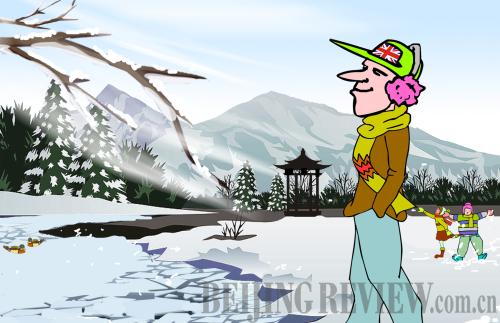|
 |
|
(LI SHIGONG) |
The weather in Xi'an is dominated by mercilessly hot summers and bone-chilling winters. Their length makes them seem unending and so overpowering that, sandwiched between these two opposing giants, the other seasons feel inconsequential. This distorted climate cycle leaves me simultaneously eager for change, yet caught unaware when that change finally comes. While I will always prefer the languid heat of summer, the winter has its own chilly charm, driving me indoors but also encouraging me to venture outside.
Winter's impending arrival in Xi'an is announced by the sudden temperature drop of late October, which leaves me feeling cold and disoriented. Inside the house, I must wear almost as many layers of clothing as I do outside. Climbing into a cold bed at night is a shock, and I have to search for my electric blanket to bring the sheets up to a cozy temperature. However, this brief, shivering segue into winter ends on November 15 when the city turns on its central heating systems. In my building, the boiler seems to only have one setting: maximum. Therefore, an unexpected mild spell can leave me sweltering inside in my flat, with little choice but to open the windows and allow the radiators to pump their excess heat wastefully out.
But the period of adjustment does not last long. At first, the lower temperature seems the only thing that distinguishes winter from autumn, but I soon notice other changes: dry and dusty, Xi'an assumes its own particular wintry color scheme. Although cloudless days are frequent, the sky's natural blue is dulled by the dust that hangs stubbornly in the air and blurs the skyline, settling silently and tinging every surface a depressing grayish-brown. By late November the last withered, dead leaves are falling from the many trees that line the roads and their graying bark blends in with the drab concrete of old low-rise apartment buildings.
The freezing temperatures combine with the air pollution to propagate colds and other illnesses. Germs seem to threaten me from all sides, and I develop a creeping paranoia as I move from one stuffy enclosed space to another. Entering the classroom in the morning, I shudder as dozens of my students snivel and dab their dripping noses with scrunched-up tissues.
But winter also brings many pleasures. The dry weather makes walking attractive. My favorite route is around Qujiang Park. The Tang-era lake is usually covered by a thick ice sheet by December, and stones litter the surface, thrown in the optimistic hope of breaking through to the water beneath. I enjoy watching the park's ducks and geese as they sit sheepishly on the bank, left with little to do except wait until the ice melts.
By Christmas, the temperature outside has dropped to the point where my radiators seem to be perfectly adjusted. Every time I return home from a trip outside, I am greeted by a wave of warmth.
The winter weather also adds another dimension to the city's food, allowing me to savor all the dishes that would instantly induce an uncomfortable sweat in the summer months. My priority becomes obtaining the warmth and energy needed to ward off the chills; starchy, spicy, soupy choices dominate my meals. I stop eating jiaozi by the plate and instead order them by the bowl. I also shun "dry" noodles in favor of those that come in a steaming broth. Even the famed yangrou paomo of Xi'an—mutton and pieces of flatbread in soup—becomes a tempting option, and leaves me feeling stuffed and ready to face the cold.
Winter also brings drastic changes to the clothing local people wear, and I enjoy observing the signature outfits of each demographic. The preferred coat among young women seems to be the knee-length down-filled puffa jacket, combined with long leather boots and thick tights. Security guards and doormen tend to favor a rugged, ankle-length PLA greatcoat in camouflage green, the only thing that can keep them insulated while they spend all day outside.
The winter brings so many changes to the city, but the novelty and enjoyment of the new season soon desert me and I am faced with the reality of three months of monotonously cold days. I quickly get tired of waddling around wrapped in so much clothing; tired of the coughing and sneezing; tired of moving between hot rooms and frigid streets; and by the time the Lunar New Year arrives, I long for the sun to reassert itself once more. I am already anticipating the short spring that sneaks in before summer and signifies that the whole uneven seasonal cycle has come full circle and is ready to begin again.
The author is a Briton living in Xi'an
Email us at: dingwenlei@bjreview.com | 